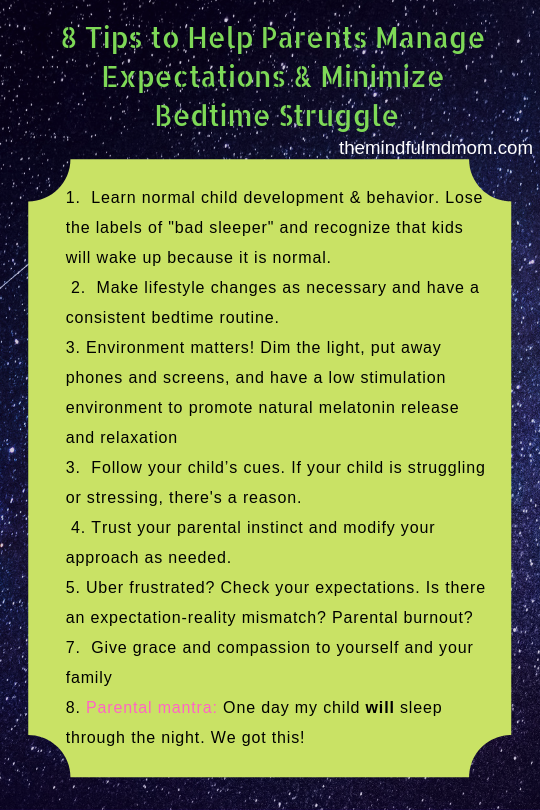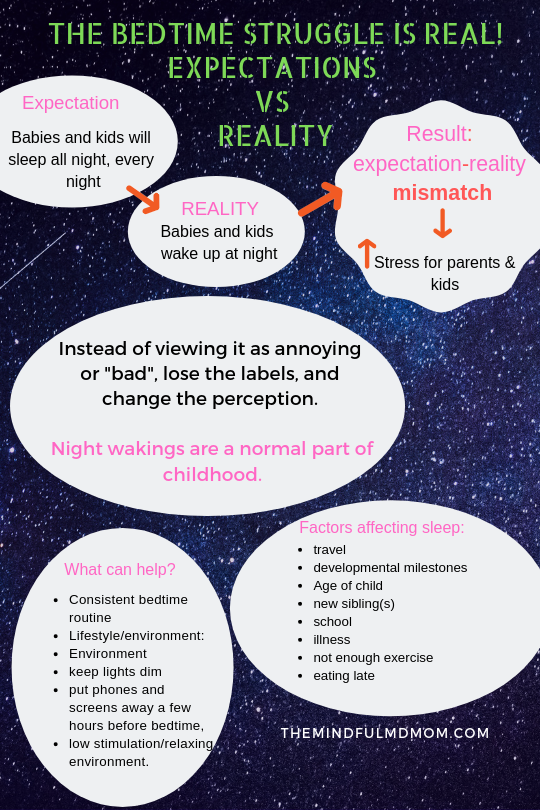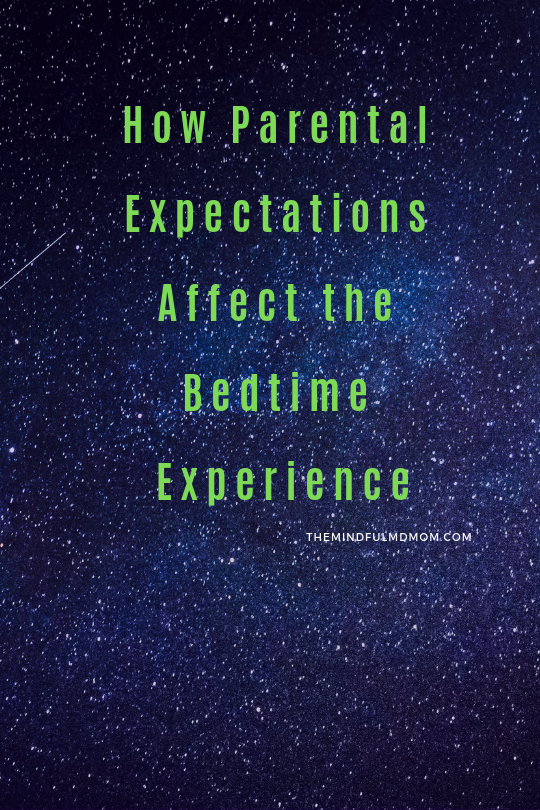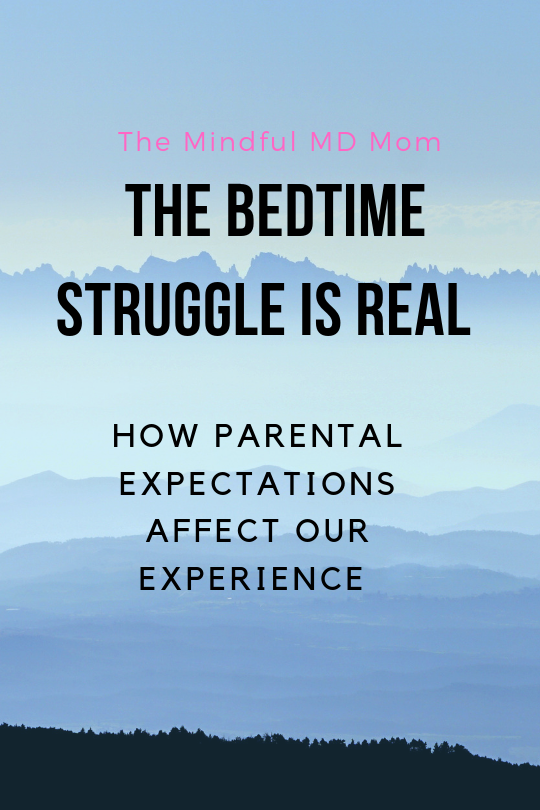How Parental Expectations Affect the Bedtime Experience
by Dr. Nadia
When it comes to an uninterrupted night’s sleep, a cloud of elusive mystery surrounds it. Many families struggle at bedtime with their baby insomniac. Commonly labeled as “bad sleepers”, these kids find novel ways to be emotionally allergic to sleep.
This post may contain sponsored products and/or affiliate links, which means I may earn a small commission with no extra charge to you if you purchase through my links. See disclosure for more information.
These kids, including my own, do not follow ‘the rules’ to sleep uninterrupted all night, every night. If baby Sam on GoT can sleep through White Walker battles and in the frigid cold of the North, every parent wonders, ‘why can’t my kids sleep in their comfy beds’?!
Well, real life is not as portrayed on television.
Both professionally and personally, I have found that there is not a one-size-fits-all solution to bedtime. Not even between two children in the same family.
Questions: why does our collective perceptions of bedtime conflict with the reality of bedtime?
Do our expectations around sleep negatively affect our experience?
Do we need to readjust our current way of thinking about sleep expectations?
What’s a sleep deprived parent to do?!
What Sleeping Like a Baby Really Means
Ah, to sleep like a baby!
People commonly use this phrase to describe restful, uninterrupted sleep. I am curious if the person who came up with this phrase spent any time with an actual, real life baby. For if he had, this phrase would never have come into our lexicon.
Countless parents–doctor moms included—feel various levels of shame, guilt, inadequacy that there is something wrong if their child is not sleeping through the night from a very young age.
The expectation is that babies and kids “should” sleep all night every night.
As a pediatrician and a mom in the parenting trenches with you, let me share a truth. Kids do not sleep uninterrupted through the night. It is a developmentally incorrect expectation.
Yes, they will sleep at some point but not in the early years.
In reality, sleep can be frequently disrupted by many factors: travel, transitions, new sibling, illness, school, developmental milestones, lifestyle, inconsistent bedtime routines, screen time, etc.
The conflict of expectation and reality plays a major role in the nightly frustration and stress for both parents and children.
The Truth about Sleep
The majority of children will wake up because that is what babies and children are wired to do. It’s normal!
Breastfed babies need to wake up every few hours to feed which in turn stimulates mom’s milk production. Skipping nighttime feeds give mom’s body the signal to decrease milk production. It is a demand-supply system.
Read more on natural ways to increase milk supply and breastfeeding tips.
Babies who are formula fed may sleep slightly longer but still need to wake up to feed.
Waking up regularly is actually a protective measure for babies.
According to Pediatrics, “[t]he ability to arouse is critical physiologically, and a leading hypothesis is that failure to arouse makes an infant vulnerable to SIDS.”
The American Academy of Pediatrics’ Healthy Children shares that “[b]abies do not have regular sleep cycles until about 6 months of age. While newborns sleep about 16 to 17 hours per day, they may only sleep 1 or 2 hours at a time. As babies get older, they need less sleep. However, different babies have different sleep needs. It is normal for a 6-month-old to wake up during the night but go back to sleep after a few minutes.”
You read that right: only 1-2 hours at a time!
So, if your baby is sleeping more than a few hours at a time, she is an exception as rare as a unicorn.
The majority of your friends who are parents are probably not experiencing a similar blissful sleep experience. Instead of asking whether her baby is sleeping through the night yet, offer to babysit so your sleep-deprived friend can get some rest.
Read more on how we inadvertently sabotage parental confidence and how mindfulness helps the parenting experience.
Fact: even adults struggle with sleep. It is an acceptable variation of the sleep experience.
So why isn’t it accepted for kids? Do we set our expectations higher for our kids than we do for ourselves?
Child Development and Sleep
In terms of child psychology, Erik Erikson describes the first stage of development is trust vs mistrust.
This stage starts in infancy and “…the infant is uncertain about the world in which they live. To resolve these feelings of uncertainty, the infant looks towards their primary caregiver for stability and consistency of care. If the care the infant receives is consistent, predictable and reliable, they will develop a sense of trust which will carry with them to other relationships, and they will be able to feel secure even when threatened”.
For a baby or young child, this translates to ‘when I cry, will someone come get me? Can I trust that my caregivers will return to take care of me or am I all alone?’
Not mastering this stage leads to increased separation anxiety, clinginess, fear of being alone, acting out more for attention, mistrust in the world around them.
Kids do not have a sense of time like adults do. Each separation—including nighttime separation—is a separate event and a new source of psychosocial stress.
Cortisol and Sleep
Understanding normal child psychosocial development and cortisol response with various sleep approaches is informative. Ongoing research in sleep outcomes will be helpful.
Does cry it out (CIO) methods stress the child during the process? How does it affect attachment to caregivers? Does it affect other developmental aspects later in life?
We know that ongoing stress occurring early in life can negatively affect development. Psychology Today states, “… letting babies get distressed is a practice that can damage children and their relational capacities in many ways for the long term“.
A study monitored babies’ cortisol stress hormone levels in responsive parenting styles vs cry it out (CIO). The babies with a responsive style showed cortisol levels normalizing. CIO babies had high cortisol levels throughout. Even when they eventually stopped crying, levels were as high as they were when they were crying.
There is a misconception that the baby stops crying because he is fine and is now “trained”. Unfortunately, this is not the case.
The babies eventually quieted but measurements of cortisol levels showed they were still silently stressing. The babies didn’t stop because they adjusted. They stopped crying because they gave up.
What’s the point of asking and crying for someone who isn’t going to show?
Dealing with Night Awakenings
The night awakenings truly are a phase if handled in a supportive and age-appropriate way.
Instead of viewing it as annoying or “bad”, lose the labels, and change the perception. Night wakings are a normal part of childhood.
The child wakes up and cries at night because it is a normal way to test their trust in their world (ie. caregiver).
When young children feel secure and stress-free, they will fall asleep and stay asleep. They need the security of knowing that when they need something (day or night), their parent(s) will respond appropriately.
However, if sleep and bedtime become associated as a negative and stressful experience, night awakenings will continue to occur well into school age and beyond.
As parents, we can readjust our expectations. Instead of expecting babies and young kids to sleep all night without waking, let’s accept that they will wake up. And when they do, we will be there for them.
When our expectations match our reality, we can be fully present and offer parental support, even if it is to gently pat their backs or hold them as they fall back asleep.
Expert tip: please don’t let the phase of nighttime awakenings make you doubt your ability as a parent. Don’t compare your experience to the all-night sleeper.
Expert tip: If you find yourself increasingly frustrated around bedtime, cycling in negativity, or angry at your child, take a moment to check in with yourself. Recognize the signs of parental burnout. Use power phrases to help you feel empowered.
Choosing a Sleep Philosophy
So, what if you’ve tried some ways and had unsuccessful results? Does that mean you have scarred your child for life? Are you a terrible parent?
No, you are not a terrible parent. The fact that you realize that your child’s is stressed and not responding well is insight and that is good.
Expectations Affect our Perceptions
Our assumptions and expectations of a situation play a major role in our overall experience.
When our expectations start to match the reality, our overall experience becomes much better. When expectations are unrealistic, the same experience becomes stressful and frustrating.
For example, knowing that a child will probably get up multiple times a night as developmentally appropriate, the parents can plan accordingly and set realistic goals of what they can achieve when the kids are asleep.
Then, when the kids sleep for much longer increments of time, it is a cause of celebration as they exceed expectations. If the children wake up, no problem, we expected that to occur. It becomes a win-win situation for both parties.
Our unmet expectations are a major source of discontent and unhappiness.
This seems like an obvious statement, right? However, applying this to real life is much more difficult if we are not aware of this expectation-reality mismatch.
Mindful Parenting Approach to Sleep
Parenting is an experience that you are learning alongside your child. It’s a team approach. Use your knowledge and experience with your child to see what works and what doesn’t work.
Try to avoid labeling kids as ‘bad sleepers’. Repeated negative associations can impact their self image. Young kids cannot separate the action from the word. When you say ‘bad sleeper’, they think it means they are bad. Additionally, kids may subconsciously continue negative behaviors thinking it is expected of them.
Read more on the parental effect on a child’s self esteem.
Being aware of normal child development and behavior can help with perspective. Kids are not trying to be annoying by waking up at night. Sleep, like any other experience, is influenced by an interplay of factors: age of child, developmental milestones, parental perspective, expectations, etc.
General rules: keep safety in mind, follow your child’s cues, discuss with your pediatrician, research with reputable evidence based sites like The American Academy of Pediatrics, and trust your parental instinct.
If your child is struggling or stressing, there’s a reason. Check your expectations. Modify your approach. Extend grace and compassion to yourself and your family as you work through it.
Eventually, you will find an approach that works for your child and your family.
You got this!










Stay tuned for Part #2 of Mindfulness & Sleep: How Lifestyle Affects Sleep
****************
Is bedtime a struggle for you or your family? What helps and what doesn’t? What sleeping tips you know now that you wish you knew before?



This post may contain sponsored products and/or affiliate links, which means I may earn a small commission with no extra charge to you if you purchase through my links. See disclosure for more information.
Articles you may enjoy:
Mindful Parenting Tips to Start Today
Meditation for Self Compassion
50 307 - 357Shares
- 357Shares
307 50




8 Comments
Sosab
March 1, 2019 at 7:19 amExcellent and meaningful review!!
themindfulmdmom
March 3, 2019 at 3:01 pmThanks!
akatwala1421
March 1, 2019 at 10:45 amI’ll be sharing this one with my mom!
themindfulmdmom
March 3, 2019 at 3:00 pmPlease do! Thanks!
Kaylie
March 13, 2019 at 11:16 amExpectations are a huge part. For older kids explaining that waking in the night is normal and not something to worry about is also a help.
themindfulmdmom
April 12, 2019 at 11:12 amTotally agree. Thanks, Kaylie!
Ntokozo
March 14, 2019 at 9:34 amHaha, I like the part where you ask if the person who came up with ‘slept like a baby’ saying has actually slept with an actual baby 🙂
Other than that, thanks for sharing this lovely post (with the tips). I’ll make sure to bookmark it for next time when insomnia attacks.
themindfulmdmom
April 12, 2019 at 11:12 amSounds great. Thanks so much for the feedback!